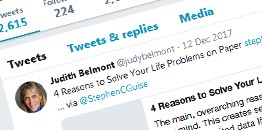
Originally a guest post on www.lifehack.org
 In my 35 years as a psychotherapist, I have been struck by the inability many people have to distinguish between fact and fiction. People get depressed, they get negative, and they get anxious for generally one main reason – they treat interpretations like facts! They never learned to do otherwise – this is not taught in school along with algebra and chemistry. People often cannot tell the difference between reality and the stories they tell themselves. My work as a therapist is to help people identify what is their story or their own personal myth and what is objective reality.
In my 35 years as a psychotherapist, I have been struck by the inability many people have to distinguish between fact and fiction. People get depressed, they get negative, and they get anxious for generally one main reason – they treat interpretations like facts! They never learned to do otherwise – this is not taught in school along with algebra and chemistry. People often cannot tell the difference between reality and the stories they tell themselves. My work as a therapist is to help people identify what is their story or their own personal myth and what is objective reality.
The following are some examples of fiction that people regard as true:
“Things always go wrong.” “He makes me so mad.” “I can’t change how I feel. “I’ll never love again.” “It’s all my fault.” “I’m a loser.”
Notice the distorted thinking, and irrational words such as “always, never, “can’t” and the fortune telling in the phrase “I will never love again!” How can anyone predict the future with certainty?
Changing these distorted interpretations to stick to the facts looks like this:
“Things do not go the way I wished very often.” “I was mad when he said that.” “It is hard to change the way I feel.” and “It might be hard to love again, but I will sure try.” “I feel partly responsible.” “I am just as worthy as everyone else.”
As a psychotherapist, I often find the more depressed and anxious a client is, the more they live in the land of fiction that they take as fact. For example, just the other day I had a client tell me that her children are misbehaving so much, and she blames herself for her drug, alcohol and sexual promiscuity in her teens which she thinks resulted in her having such difficult children. She felt she was being punished for her past, and was getting “paid back” for being a problem teen. She felt this way despite the fact that at the ripe age of 45 she had been leading a law abiding life as a mother, wife, and school teacher for 20 years! Her lack of self- forgiveness for her past regretful behavior loomed larger than life, even though those behaviors were of the distant past. Yet, they still defined her as a person, and she became a person not defined by her dreams and aspirations, but rather her disappointments and her poor choices.
Separate Fact From Fiction Takeaways
- Many thoughts we treat as facts are really interpretations
- Many interpretations are so automatic we do not know they’re not fact
- Examine your thought habits so that you are aware of what is your “default” way of thinking – only then can you change them.
- As you can discern facts from your take on things, you will feel more positive and empowered
- Realize when you are just telling yourself stories! Nothing is wrong with being a story teller – just know when you are!
- Stop upsetting yourself with nonsense that you believe to be true
- Stop over-catastrophizing and making mountains out of molehills
- Refuse to feel like a victim and feel more like a victor
- Be more solution focused and not problem focused
Activity for Your Separating Fact From fiction
Take a magnifying glass to remind you to be “thought detective” to look behind what you are thinking and identify distorted thinking that is fiction rather than fact. Remind yourself that when we interpret, we are telling ourselves stories. There is nothing wrong with stories – but just know that they are not real or true!
Remember, when you can not separate fact from fiction, one plus one does not equal 2, and not even 11, but numbers that don;t make sense, like 145! And the more irrational you live in the land of fiction, the higher the numbers go up!
So take your magnifying glass and identity your thought habits – and make sure you can distinguish between the stories you tell yourself and the actual facts at hand!



